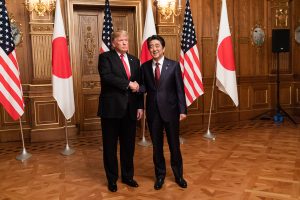At the outset of his second term, U.S. President Donald Trump has again been strongly pushing for an “America First” approach to foreign affairs, causing chaos in the international community already.
He has not ruled out using military or economic force in order to acquire Greenland or the Panama Canal, calling both critical to U.S. national security.
Since his first term, Trump has intended to be “unpredictable” as part of his negotiation tactics. He has intentionally made outrageous and extreme comments and actions in order to force other countries to accept his demands and conditions.
He wrote about this tactic in his book “Crippled America: How to Make America Great Again” published in 2015.
As Trump admits, he is simply been putting into practice the “madman theory” of diplomacy borrowed from former President Richard Nixon, whom Trump respects. This theory holds that a leader appear to be capable of anything – even to the point of insanity – as a means of keeping other countries in check and earning concessions.
Nikki Haley, the U.S. ambassador to the United Nations under the first Trump administration, also wrote in her book “With All Due Respect” that she used “the unpredictability of President Trump” to help convince the Chinese to back tougher sanctions on North Korea, mentioning the madman theory.
If Trump’s extreme rhetoric is for show, then, what type of person is Trump actually?
It may be intriguing for the world to know what former Japanese Prime Minister Abe Shinzo (who was assassinated in 2022) and his widow, Abe Akie, said about Trump’s true nature.
Trump and Abe spoke 51 times, including 14 face-to-face meetings and 35 phone calls. The two leaders showed off their “bromance” as they played golf, ate burgers and had serious talks on trade, North Korea, Iran, and more.
Based on that personal knowledge, Abe’s assessment was that Trump was all bluff, according to the book “Child of Destiny: Chronicles of the Abe Shinzo Administration,” published in October 2024 by former Asahi Shimbun editor-in-chief Funabashi Yoichi.
Regarding Trump’s response to the 2017 North Korea nuclear and missile crisis, Abe said, “I think Trump is secretly afraid of military operations. When that emergency happens, he may back down,” as quoted by Funabashi.
In November 2017, the Trump administration deployed three U.S. Navy aircraft carrier strike groups simultaneously to the sea between Japan and the Korean Peninsula to put military pressure on North Korea’s supreme leader Kim Jong U. However, Abe said, “To be honest, I wish they had gone a little further,” according to the book. Abe wanted the aircraft carriers to approach the very edge of North Korea’s territorial waters.
“If Kim Jong Un knew that Trump was actually reluctant to take military action, it would be impossible to exert pressure on him. That’s why it was absolutely necessary to make sure that the outside world didn’t notice it,” Abe said, according to his memoir published in February 2023. “It was necessary to make North Korea believe that Trump would do it when the going gets tough. Not only I, but also the U.S. security team were desperate to hide Trump’s true nature.”
Michael Flynn, the first national security adviser in the first Trump administration, once described Trump as a “peacenik,” meaning an anti-war person, according to Funabashi’s book. The “peacenik” Trump was barely able to contain the neoconservative foreign military interventionists in the Trump administration from acting against Iran even after two RQ-4A Global Hawk unmanned aerial vehicles were shot down by Iran’s Revolutionary Guard in June 2019.
Abe Shinzo’s widow, Abe Akie, appears to share the same view, albeit expressed more positively.
On December 22 last year, Akie said at a speech in Tokyo, “When we talked about war, President Trump said, ‘If there had been me and Shinzo during the last war, there would have been no war.’ At that time, I thought that President Trump is someone who does not want war, so I hope that this time he will lead us to a peaceful world.”
She was discussing the conversation they had when Trump visited Japan as a state guest and with his wife Melania in May 2019 and the four of them dined at a restaurant in Tokyo’s Roppongi
Akie dined with Trump and Melania again at Trump’s Mar-a-Lago residence in Florida on December 15, 2024. As if to confirm that Trump is a pacifist, at that time Trump said to Akie that as the next U.S. president, he “wants to protect world peace.” He even wrote “peace” in English in a photo book he was giving to Prime Minister Ishiba Shigeru.
Trump’s bravado is tinged with a strong inclination to favor peace – and a reluctance to use military force. This may be why he seems to have no choice but to use economic tools, such as tariffs, to achieve his goals.

































